Explore Case Studies by Location
Explore Case Studies
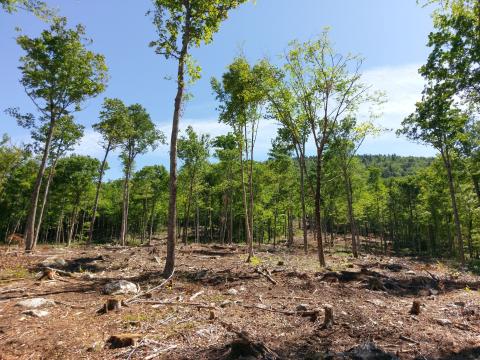
|
“La Playa” Beech Management (Groton State Forest, Vermont)Description: Reduce abundance of diseased beech to encourage regeneration of healthy beech, yellow birch, red spruce, sugar maple, and eastern hemlock while preserving habitat value and structure. State/Province: Vermont Forest Type: Northern Hardwoods Citation: Scott Machinist, 2020, “La Playa” Beech Management (Groton State Forest, Vermont), Northeast Silviculture Library, University of Vermont. Accessed 02/25/2026 at https://www.uvm.edu/nesl/webform/new_case_study/submissions/28. |
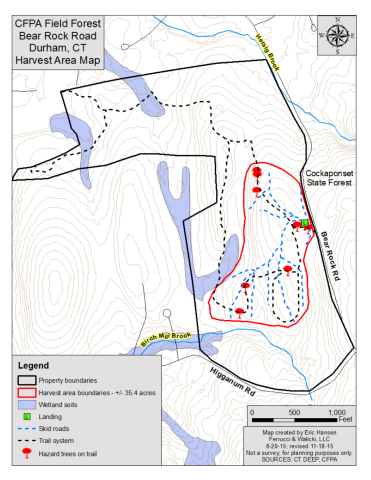
|
Howard B. Field ForestDescription: The landowner is interested in maintaining forest health and tree species diversity, while simultaneously not disturbing existing recreational trails and limiting impacts to aesthetics. A mix of treatments were applied, including single tree selection, group selection, and thinning to move and enhance vigor of remaining trees, and to promote regeneration of native species of trees and other vegetation. Trees impacted by emerald ash borer (EAB) and spongy moth, as well as some dead trees near trails, were cut to maintain safety. The remaining trees and regeneration have responded very well to treatments. State/Province: Connecticut Forest Type: Central hardwoods Citation: Eric Hammerling, 2016, Howard B. Field Forest, Northeast Silviculture Library, University of Vermont. Accessed 02/25/2026 at https://www.uvm.edu/nesl/webform/new_case_study/submissions/41. |
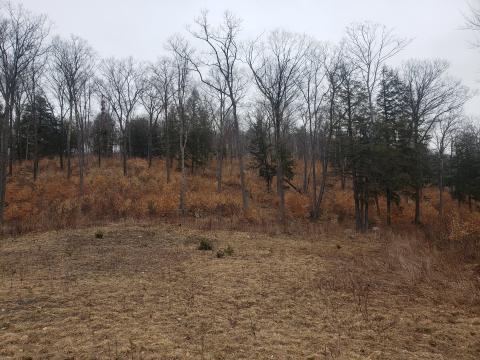
|
Oak regeneration harvest at Hope Forest in Danbury, NHDescription: A commercial timber harvest was carried out in the fall of 2014 after an oak mast year. Prescriptions included two low-density shelterwood areas (12 and 18 acres in size), and five large group openings (1-2 acres in size). The goal was to regenerate oak along with a mixture of other desirable hardwood species. State/Province: New Hampshire Forest Type: Northern Hardwoods Citation: Gabe Roxby, 2015, Oak regeneration harvest at Hope Forest in Danbury, NH, Northeast Silviculture Library, University of Vermont. Accessed 02/25/2026 at https://www.uvm.edu/nesl/webform/new_case_study/submissions/43. |
|
|
Heart of DarknessDescription: The goal of this project is to create a more diverse forest structure by releasing a component of the forest understory. This was achieved by removing gaps of the overstory to fully release the advanced regeneration below. Post-harvest, the released understory is now able to function as a new cohort in part due to the abundance of desirable regeneration and adds to the structural diversity across the stands being treated. State/Province: Vermont Forest Type: Spruce-fir Citation: Scott Machinist, , Heart of Darkness, Northeast Silviculture Library, University of Vermont. Accessed 02/25/2026 at https://www.uvm.edu/nesl/webform/new_case_study/submissions/45. |
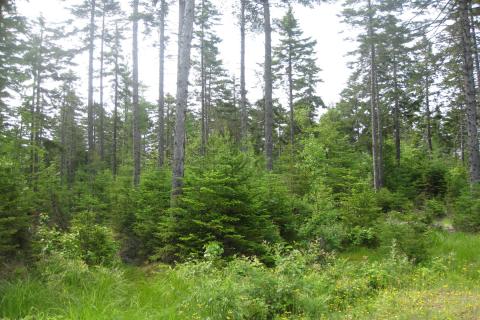
|
Baskahegan LandsDescription: The goals of this project are to encourage future productivity, promote high-value timber porduction, and protect environmental and ecological integrity while enhancing recreational aesthetics. This has been done by performing the shelterwood system, with pre-commercial thinning. Silviculture over the past 40 years has proven to be successful. State/Province: Maine Forest Type: Spruce-fir Citation: Kyle Burdick, , Baskahegan Lands, Northeast Silviculture Library, University of Vermont. Accessed 02/25/2026 at https://www.uvm.edu/nesl/webform/new_case_study/submissions/46. |
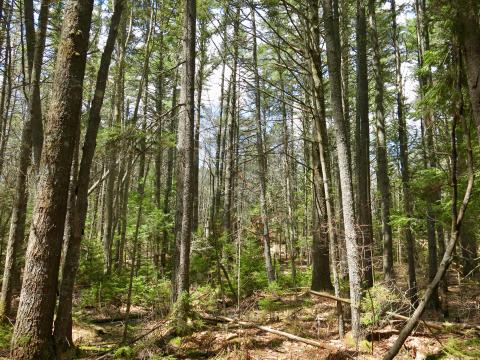
|
Holt Research ForestDescription: The Holt Research Forest is the site of long-term forest ecosystem research in Arrowsic, Maine. Research goals are to monitor long-term changes in the forest's plant and animal populations, and to document the effect of ecologically-based forest management on these populations. The woods are predominantly dry-ridge, oak-pine ecosystem in Maine's coastal climatic and midcoast biophysical regions. State/Province: Maine Forest Type: Mixedwoods Citation: Logan Johnson, , Holt Research Forest, Northeast Silviculture Library, University of Vermont. Accessed 02/25/2026 at https://www.uvm.edu/nesl/webform/new_case_study/submissions/47. |
|
|
Fiber Fiber Fiber Timber Harvest - Victory Basin WMA / Victory State ForestDescription: Final entry of extended irregular shelterwood. State/Province: Vermont Forest Type: Northern Hardwoods Citation: Paul Szwedo, 2022, Fiber Fiber Fiber Timber Harvest - Victory Basin WMA / Victory State Forest, Northeast Silviculture Library, University of Vermont. Accessed 02/25/2026 at https://www.uvm.edu/nesl/webform/new_case_study/submissions/48. |
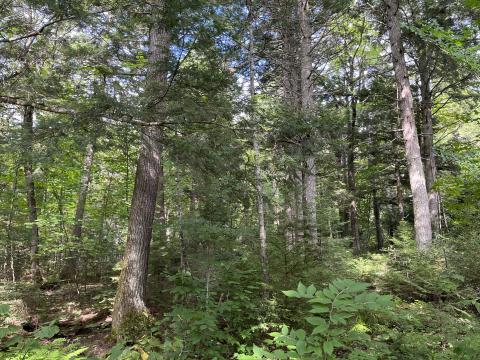
|
Frost Pond ForestDescription: Frost Pond Forest (FPF) is an approximately 150-acre stand within Baxter State Park's Scientific Forest Management Area (SFMA). The goals of this project are to maintain old-growth structural components and characteristics, promote the production of high-value speciality timber products such as tonewood, and monitor the forest's response over time. State/Province: Maine Forest Type: Spruce/hemlock Citation: Shane Miller, , Frost Pond Forest, Northeast Silviculture Library, University of Vermont. Accessed 02/25/2026 at https://www.uvm.edu/nesl/webform/new_case_study/submissions/50. |
|
|
Indian Stream Operating Unit - Connecticut Lakes Natural AreaDescription: The Indian Stream Operating Unit is located in northern New Hampshire within the towns Clarksville and Pittsburg. There are 25,000 total acres, 10,000 of which are the management area, and the other 15,000 have no active timber management and serve as a Nature Preserve. With site conditions, it has been reported that the site has a high chance to shift to softwood type, and the management is prescribed to help regenerate mixed wood and hardwood species. Expanding gap irregular shelterwood has been prescribed to the stands to help regenerate 15% of the manageable acres every 15 years for softwood regeneration and stem density, to promote snowshoe hare population growth. State/Province: New Hampshire Forest Type: Mixedwoods Citation: New Hampshire Fish and Game, , Indian Stream Operating Unit - Connecticut Lakes Natural Area, Northeast Silviculture Library, University of Vermont. Accessed 02/25/2026 at https://www.uvm.edu/nesl/webform/new_case_study/submissions/51. |
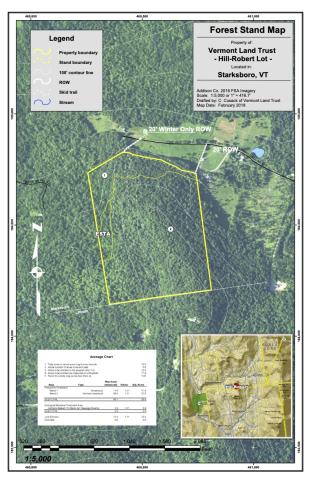
|
Jerusalem Skyline - Management for Emerald Ash Borer, Climate Change Adaptation, and Forest Bird HabitatDescription: As Vermont's Forests are impacted by the compound stresses of a changing climate, fragmentation, and non-native species, it becomes more important to maintain all our native species as a mechanism to enhance resiliency. Breeding bird habitat was lacking, and emerald ash borer threatens the long-term existence of all species of ash native to North America, including the Jerusalem Skyline, with 7% of the property's basal area belonging to white ash. The ash on the site have been monitored for signs of EAB and tree health using the MaMa protocol. During the winter of 2020-2021, an ash demonstration harvest was conducted, but limited by steep ground. In the summer of 2021, 16 white ash trees were injected with emamectin benzoate and the remaining 4 trees were treated in July 2022 to preserve genetic diversity and protect seed trees for future ash regeneration. State/Province: Vermont Forest Type: Northern Hardwoods Citation: Caitlin Cusack, , Jerusalem Skyline - Management for Emerald Ash Borer, Climate Change Adaptation, and Forest Bird Habitat, Northeast Silviculture Library, University of Vermont. Accessed 02/25/2026 at https://www.uvm.edu/nesl/webform/new_case_study/submissions/52. |